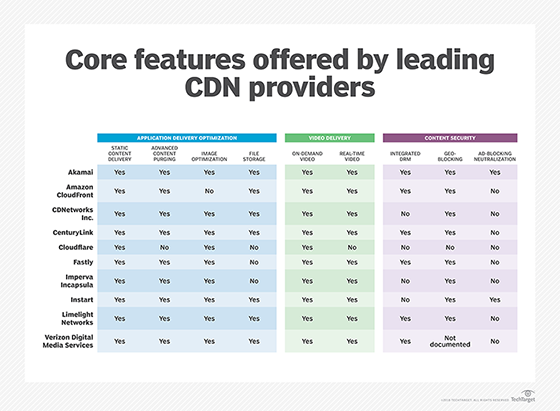Comparing content delivery offerings from 10 leading CDN providers
It may seem that all CDN services have similar functionality for optimizing traditional apps and video. But before you select a CDN, learn how the offerings compare and differ.
By their very nature, content delivery networks, or CDNs, are an amalgam of services. They are best thought of as suites of related, cloud-delivered products. At the highest level, a consistent set of CDN services can be found across the various vendor offerings.
Once you've identified the features essential to your organization, it's time to examine and compare what services the leading CDN providers offer. Here, we explore offerings from Akamai Technologies, Amazon CloudFront, CDNetworks Inc., CenturyLink, Cloudflare Inc., Fastly Inc., Imperva Incapsula, Instart Logic Inc., Limelight Networks Inc. and Verizon Digital Media Services.
Let's first delve into two core uses for CDNs: optimizing traditional applications and video. We'll also examine areas that are closely aligned with delivering content, including protecting content that has licensing or geographical restrictions.
A follow-up article will examine related functions that can provide optimization on a global level, enhance the network security and availability of your content, and provide specialized services that are required in certain parts of the world.
What to know before signing a CDN contract
Migrating the delivery of key content to a CDN is a big commitment. Once your company has selected a particular CDN, it could be a huge job to switch to a competitor. For this reason, it's critical you know the specifics about every feature important to your organization before signing a contract.
For certain features, the CDN provider may implement a service in conjunction with a third party. It's important to know how well various third-party services are integrated with the core CDN service. Be sure to ask the provider if important functions are integral parts of the core product or if they're implemented by a third party. In the latter case, ask for specifics about how seamless the integration is with the core.
Let's take a look at examples of the functionalities offered by leading CDN providers. For a more comprehensive list of features and functionality, refer to the chart below.

Application delivery optimization
Simply handing off an application to your CDN provider and forgetting about it just doesn't work. As part of the optimization, you will need to control how and when stale content gets discarded or updated. You will need to deliver content to many different types of devices that have various screen resolutions. And you may need storage for file objects. Let's take a look at these concerns and some of the features CDN providers offer to address them.
Advanced purge options. Organizations can have dramatically different requirements when it comes to managing cached content. Before selecting a CDN provider, you should have a general idea of what objects you will need to purge. This can include individual files, directories or "wild-card" objects. A wild card is when a "star*" is substituted for all or part of a file name or extension. For example, "*.jpg" would purge all JPEG picture files. You also must decide how quickly you want these objects to be purged and whether manual maintenance is acceptable, or if it needs to be done via program-level access.
All the CDN providers examined in this article support a complete purge of cached data, but they differ in their ability to offer a more granular purge. Akamai, CenturyLink, Cloudflare, Fastly, Incapsula and Limelight Networks enable purge content to be selected by multiple, granular methods, including individual URL, content provider tag or cache tag. Cloudflare's purge-by-tag option is available only to subscribers of its top-end enterprise service class.
For users who want program-level access, API support is essential. Akamai, CenturyLink, Cloudflare, Fastly, Incapsula, Instart Logic and Limelight Networks offer a purge-function API. Some vendors note the speed at which global cache is cleared.
For example, Akamai claims content will be purged within five seconds, whereas Fastly claims its purge will take only 150 milliseconds. Amazon only allows purging by objects and wild cards, while Cloudflare supports a full purge, as well as purge by individual objects -- wild cards aren't supported. AWS CloudFront uniquely charges users for purging objects.
Image optimization and management. Although image optimization is important to most organizations, it is critical to companies that rely heavily on visual images. This includes companies in the fashion, real estate, travel and general retail vertical markets. With so much web browsing and e-commerce migrating from desktops to mobile devices, dynamically adjusting images to suit the target device is certainly important.
Of the various image-oriented functions, compression and automatic resizing for electronic devices like mobile phones and tablets are the ones most users want. Fortunately, they are offered by most CDN providers. CDNetworks provides filters and watermarks that might be of particular interest to users who need to brand or otherwise mark image content. But note that not all CDN providers offer image functions, and some partner with other companies to provide image-related functionality.
Editor's note
Using extensive research into the content delivery network market, TechTarget editors focused on 10 leading providers of shared global content delivery network services. Our research included data from TechTarget surveys and reports from research firms, including Gartner and Forrester.
File storage. Many customers, including software companies and organizations with catalogs, have files that need to be distributed via their CDNs. For these organizations, cloud-based file storage is a must. All the CDN providers profiled here offer cloud file storage, with the exception of Cloudflare, Fastly and Incapsula.
Fastly notes that cached object sizes can be as large as 5 GB. The implication is a file like a typical business-oriented PDF will be far smaller than this limit, so being cached is effectively storing it in the cloud. Akamai and Limelight consider their cloud file storage CDN-class, meaning files are replicated globally to bring them closer to potential users.
Several vendors offer other types of application delivery optimization. For example, Akamai, CenturyLink, Fastly and Incapsula offer support for the newer, more efficient HTTP/2 web protocol.
Vendors such as Incapsula and Instart can provide minification and optimization of JavaScript code. In such cases, vendors analyze code that's delivered, identify commonly used code and generate an optimized version of the files to speed delivery.
In addition to delivery optimization, Fastly's Varnish Configuration Language -- its proprietary scripting language -- allows customers to program specific custom actions based on requests and responses.
Video delivery optimization
Given the potential load video delivery can have on origin servers and origin networks, video is a prime candidate for delivery via CDN. All the vendors profiled here support streaming video. With the exception of Cloudflare and Incapsula, all the CDN providers also support live video delivery.
On-demand video. Vendors, including Akamai, Fastly and Limelight Networks, support a variety of popular streaming formats that include HTTP Live Streaming (HLS), HTTP Dynamic Streaming (HDS), Microsoft Smooth Streaming (MSS) and Dynamic Adaptive Streaming over HTTP (MPEG-DASH). Some vendors, including CenturyLink and Limelight, can automatically create the on-demand version of the content directly from a livestream.
Limelight can also transmux content on the fly in order to avoid having to create and store separate versions of the on-demand video content. CenturyLink's video services extend to providing customers with the satellite uplink from the video origination site. Some CDNs can automatically take a customer's live video and repackage it as on-demand video.
Real-time video. Many of the CDN providers profiled here support the delivery of all major HTTP video streaming formats, as noted above in our discussion of on-demand video. Akamai supports HLS, HDS, MSS and MPEG-DASH. CenturyLink supports HLS and MPEG-DASH. Fastly supports HDS, HLS, MSS and MPEG-DASH. Customers can use the CenturyLink API to self-provision and configure live delivery in minutes.
Limelight's video platform can be used to manage and prepare video files for delivery. In addition to automatically creating multi-bitrate, multiresolution versions, it provides functions such as custom metadata, thumbnail selection, trim and closed caption. Fastly's video preconditioning can help to streamline dynamic ad insertion.
While not optimization, per se, Akamai will handle customers' video as a managed service -- a good alternative for customers who don't want to dedicate personnel to video delivery.
Content security
Many organizations are concerned with who reads or downloads content and where those readers are located. Companies that provide subscriptions to video, audio and text content need to control access. Other companies may have licenses to distribute only to specific countries or geographical regions, so content security is critical. But content security is not necessarily important to all companies. For example, a company that's distributing a product catalog or a company that hosts public domain documents is less concerned with who downloads that information or where the user is located.
Digital rights management. With the exception of CDNetworks, Cloudflare, Incapsula and Instart, all the CDN providers examined here offer support for digital rights management (DRM). For example, Fastly partners with Intertrust Technologies and its ExpressPlay uDRM for digital rights management services.
With DRM support, specific protocols and key management schemes need to be supported. If your company uses DRM, be sure your particular DRM software is supported. Akamai supports a portfolio of DRM products, while Amazon CloudFront supports Microsoft PlayReady. Limelight can add DRM in real time via its multi-DRM software that supports Google Widevine, Microsoft PlayReady and Apple FairPlay.
Geo-blocking. For companies that need to make delivery decisions based on the physical location of a user, geo-blocking can help protect them and their customers from malicious activity by blocking content delivery to specific users. Akamai, CenturyLink, Fastly, Incapsula, Instart and Limelight are among the vendors that support this function. CenturyLink's service can be fine-tuned to city and zip code levels. In addition to general geo-blocking, Akamai offers whitelisting and blacklisting of IP addresses, as well as the ability to automatically serve alternate content to customers that reside on the blacklist.
Ad-blocking neutralization. While ad blocking plugins might make the viewing experience better for the user, advertisers and the platforms serving up ads vehemently dislike them. Only two of the vendors examined here support the ability to combat ad blockers.
Akamai offers ad-blocking capabilities in partnership with ChameleonX. The product integrates into the Akamai service offering and monitors web assets and protects them from ad-blocking code. Similarly, Instart Logic's offering can detect the presence of an ad blocker in a user's web browser and uses encryption to make sure ads are delivered. This service works with Instart's CDN, but can also be used in conjunction with other CDNs.








